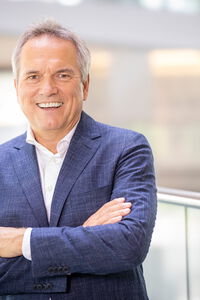Otto Warburg Medal 2025 for Matthias Hentze
In recognition of his fundamental contributions to understanding gene regulation by RNA-binding proteins and the identification of RNA-binding proteins, Prof. Dr. Matthias Hentze has been awarded the Otto Warburg Medal 2025 by the German Society for Biochemistry and Molecular Biology at the 76th Mosbach Kolloquium.
For more than three decades, Matthias Hentze has shaped the understanding of RNA biology and made fundamental contributions to the elucidation of the mechanisms by which mRNA is regulated in the cytoplasm through post-transcriptional interaction with RNA binding proteins. His groundbreaking discovery of iron regulatory proteins (IRPs), which bind to specific RNA sequences (iron responsive elements, IRE) and control iron metabolism at the post-transcriptional level, led to the realization that cytosolic, RNA-based regulatory systems regulate a variety of eukaryotic mRNAs. These systems therefore play a central role in developmental biology, cell differentiation and the development of cancer or neurodegenerative diseases. Beyond basic research, these findings have contributed to RNA being recognized today as an important therapeutic target structure. Hentze established computer-based methods for the targeted identification of RNA elements in proteins at an early stage. The "RNA Interactome Capture" methodology he developed made it possible to capture the entirety of cellular RNA binding proteins using a proteomics approach. With the innovative "RBDmap" method, he also created a way of identifying novel RNA-binding motifs in proteins, which also allows mutations to be generated in the proteins that selectively prevent RNA binding without impairing the actual protein function.
Matthias Hentze studied human medicine at the University of Münster and at universities in the UK. His doctoral thesis with Professor von Figura in Münster dealt with the biogenesis and maturation of lysosomal enzymes. As a postdoctoral researcher, he worked with Professor Richard D. Klausner at the renowned National Institutes of Health (NIH) in Bethesda (Maryland, USA) before moving to the European Molecular Biology Laboratory (EMBL) as a scientific group leader, where he is currently Director. Matthias Hentze is also Professor of Medical Molecular Biology at Ruprecht-Karls-Universität Heidelberg, where he was involved in founding the Molecular Medicine Partnership Unit (MMPU), of which he is co-director. Matthias Hentze is also an elected member of the German National Academy of Sciences Leopoldina, the Australian Academy of Science, the European Molecular Biology Organization (EMBO), an honorary member of the American Academy of Arts and Sciences and a member of the editorial boards of well-known international journals and the scientific committees and boards of trustees of renowned research institutes in Germany and abroad.
The Otto Warburg Medal, endowed with €25,000, is one of the most esteemed awards in the field of biochemistry and molecular biology. It recognizes exceptional lifetime achievements in science.
The Otto-Warburg-Medal is both an encouragement and a recognition, and one naturally strives to continue to make scientific contributions at this level

 Johannes Buchner Technical University Munich, Bearer of the Otto-Warburg Medal 2024
Johannes Buchner Technical University Munich, Bearer of the Otto-Warburg Medal 2024